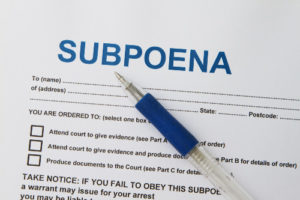Legally Reviewed By:
Brian P. Gabriel, Esquire
 A subpoena—sometimes referred to as a court summons—is a legal document issued by a magistrate that requires you to appear in court and adhere to a specific request. This might be your direct participation in a court case as a witness or a demand to produce certain documents or objects as evidence. In some instances, a subpoena can also compel the recipient to allow a premises inspection.
A subpoena—sometimes referred to as a court summons—is a legal document issued by a magistrate that requires you to appear in court and adhere to a specific request. This might be your direct participation in a court case as a witness or a demand to produce certain documents or objects as evidence. In some instances, a subpoena can also compel the recipient to allow a premises inspection.
Receiving a subpoena can raise lots of questions: Why have you been subpoenaed? What information or records do you need to provide? Are you entitled to withhold privileged information or records? And perhaps most importantly, what happens if you ignore it altogether? In general, turning your back on a subpoena can carry severe penalties, including a fine or jail time.
What Is a Subpoena and How Is It Served?
A subpoena is an order made by a court that requires the recipient to either produce documents, attend court to give evidence, or both. There are several ways in which a subpoena can be served, though it’s typically provided by an officer of the court or by a certified process server through the mail, email, or by hand.
There are three main types of subpoenas with which you may be served:
- A witness subpoena requires an individual to appear in court in person on a specific date and provide witness testimony in an ongoing trial.
- A subpoena duces tecum requires the recipient to produce documents, records, and other pertinent publications. It’s important to note that complying with this type of subpoena may involve mailing or emailing the documents without necessitating an in-person appearance.
- A deposition subpoena requires an individual to provide copies of business records or appear at a deposition to answer questions. This type of subpoena differs from a subpoena duces tecum in that the documents and testimony requested are part of the discovery process before trial and may not be used in an actual court hearing.
Once you’ve received a summons or a subpoena from the court, it may be in your best interest to secure the help of an experienced criminal defense lawyer who can instruct you on your next steps, especially if the case involves you or your family.
What Are the Penalties If You Ignore a Subpoena?
No matter your disinterest in the investigation or concern that responding to the subpoena could cause additional problems, you have an obligation to do so under federal law. Failing to answer a subpoena—whether it be for your testimony in a deposition or for records that are pertinent to a court case—is punishable as contempt by the court or agency issuing the subpoena and will likely result in legal consequences.
Punishment may include monetary sanctions and even imprisonment. These consequences can come from the court that’s hearing the case in which you were subpoenaed or the governing body that issued the subpoena. When this is the case, a hearing will be held to discuss your non-compliance with the subpoena.
What If You Don’t Have What the Subpoena Calls For?
There may be some cases in which you’re subpoenaed for documents that you may not possess or that you feel should fall under some form of privilege. When this is the case, consult an experienced Jupiter, FL defense attorney about how you should approach the subpoena. In cases where you don’t possess requested documents or you believe those documents fall under privilege, the court or agency can hold a hearing to determine how to proceed with your subpoena and the requested documents.
The worst thing you can do in this scenario is completely ignore the subpoena. Even if the court finds that you were incorrectly subpoenaed because you don’t possess the correct documentation, they may still penalize you for ignoring the initial request.
Concerned About Ignoring a Subpoena? Contact West Palm Beach Defense Attorney Brian Gabriel
If you’ve been served with a subpoena or court summons of any kind, it’s important that you get in touch with an experienced criminal defense lawyer to discuss your next steps. For legal assistance, look no further than The Law Office of Gabriel & Gabriel. By seeking the help of a criminal defense attorney like Brian Gabriel, you may be better equipped with the knowledge and understanding of what you can expect and whether or not you must oblige to a request.
Attorney Brian Gabriel has served the community of West Palm Beach for more than 30 years as a criminal defense attorney. He understands the complexities that are often involved with subpoenas and can help protect your rights. Call (561) 622-5575 or complete a contact form for a free consultation.



